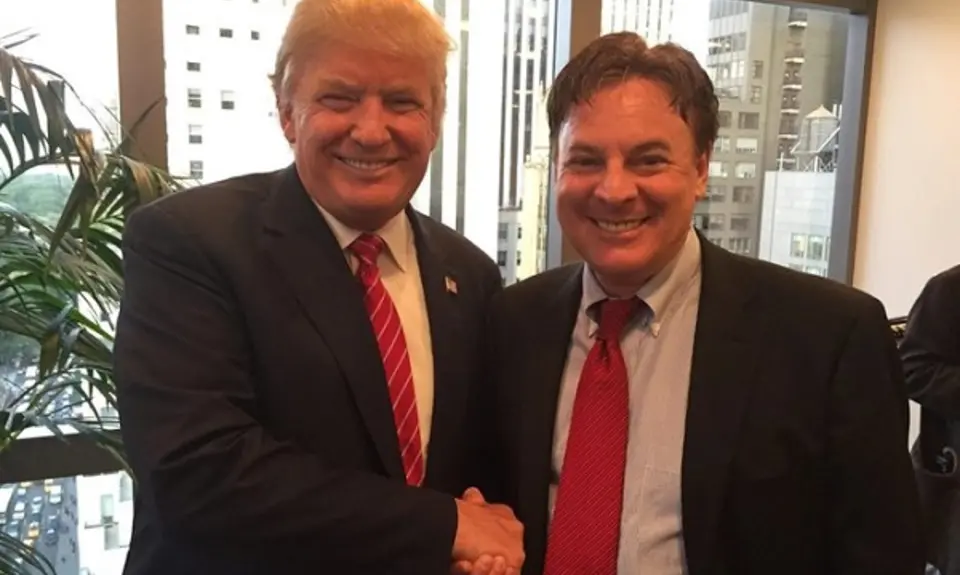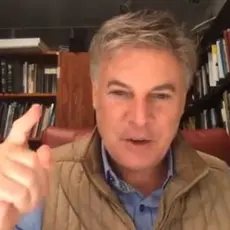In 2021, MAGA cultist and right-wing activist Lance Wallnau proudly declared himself to be a Christian nationalist.
"People say, 'Oh, Lance, I don't know, you sound like a Christian nationalist,'" Wallnau proclaimed. "Yes, I am a Christian nationalist. And I will take the flag that God gave us, with his blessed freedom and blessed government and blessed nation, and I will take that flag and lead them to the cross. Give me the flag, and I'll carry it all the way to Calvary, and I will plant it there where the cross is and say, 'There's the one that gave you the nation, there's the only one that can save this nation. We've got to give our lives to Jesus.'"
Eventually, Wallnau realized that labeling himself a Christian nationalist was not a smart political strategy and so he began distancing himself from the term, claiming that it was "invented by the left in order to slander Christian conservatives."
That approach has not been particularly effective either and so Wallnau has hit upon a new strategy of simply redefining what it means to be a Christian nationalist.
As he explained in a presentation that he featured during a recent episode of his "The Lance Wallnau Show," Wallnau now insists that Christian nationalists are simply "Christian patriots."
"Guys like me, who are nothing more than Christians who care about the future of their country, become labeled as extremists, which scares away people from coming to events like this," Wallnau said, "because then my name is used as a litmus test: 'Are you going to go to that meeting with that dangerous Christian nationalist?'"
"Well, what exactly is a Christian nationalist?" he continued. "I've been asked that. I never used the word, but since it's being used at me, I've got to figure out what it is. The best I could figure out is it's the word that was used by [Abraham] Lincoln, Teddy Roosevelt, and Franklin Roosevelt to describe Christian patriots. That's the words they used."
"It's a patriot," Wallnau asserted. "It's honoring the people that are sacrificed to give you what you've got. It's trying to preserve what was sacrificed for so that it could be handed off to the next generation. It's being sober-minded about the faults and the flaws of your own family tree, while at the same time not trying to character assassinate your in-laws or poison your children's mind regarding their dysfunctional family."
"But this is the narrative that the left frequently uses in order to discredit America and discredit Christians that are patriots," Wallnau griped.
Of course, Wallnau's redefinition of the meaning of "Christian nationalism" is entirely made-up and self-serving and has no basis in history or fact.
As Right Wing Watch has explained before:
There are countless articles explaining just what Christian nationalism is, but perhaps the most succinct definition was provided by professor Bradley Onishi, author of "Preparing for War: The Extremist History of White Christian Nationalism--and What Comes Next," during an appearance on NPR's "Fresh Air' earlier this year. During the broadcast, Onishi explained that what sets Christian nationalists apart is their belief that they are entitled to occupy a position of privilege from which they can ensure that their agenda dominates government and society:
I think in very simple terms, Christian nationalism is the idea that Christian people should be privileged in the United States in some way - economically, socially, politically - and that that influence and that privilege is a result of the country being founded by and for Christians. Christian nationalism is not the idea that others can't be here - that if you're a Muslim or an atheist, that you have to leave. It's also not the idea that only Christians can be part of the government. However, for most Christian nationalists, there is a core belief that the story of the United States is one where it has been elected by God to play an exceptional role in human history, and as being chosen by God, it's the duty of Christian people to carry out his will on Earth.
So Christian nationalists take an approach to their Christianity that says it should have an undue influence on our government, on our economics, on our culture, and that it is by dint of our history, the religious faith that is meant to be privileged in our public square. With that said, there are different kinds of Christian nationalists and different ways that people manifest their understanding of the term. But when it comes down to it, if we all sit down as Americans at a table and there are people from different backgrounds, different ethnicities, different faiths, and someone who is a Christian says, just by being at this table, I should have a special place, well, to me, that's Christian nationalism because you're saying that somehow this country is yours in a way that it is not for everyone else. And to me, therein lies the problem.
This is the standard understanding of Christian nationalism and even Christian nationalists are open and unapologetic about promoting it.





